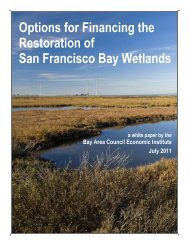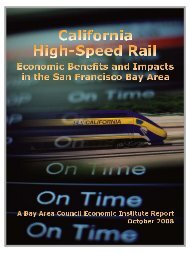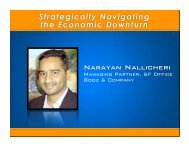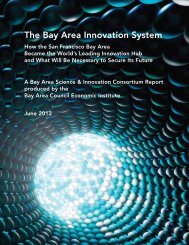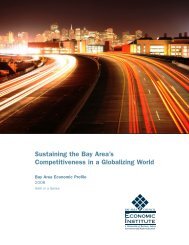Ties That Bind - Bay Area Council Economic Institute
Ties That Bind - Bay Area Council Economic Institute
Ties That Bind - Bay Area Council Economic Institute
You also want an ePaper? Increase the reach of your titles
YUMPU automatically turns print PDFs into web optimized ePapers that Google loves.
32<br />
<strong>Ties</strong> <strong>That</strong> <strong>Bind</strong><br />
Taiwan’s First Generation of Engineers<br />
Learns to Improvise<br />
Ta-Lin Hsu’s family fled to Taiwan in 1949, at the time of the<br />
Communist takeover on the mainland. He recalls coming to the<br />
U.S. in the 1960s as part of a wave of Taiwanese engineering<br />
and science students encouraged to emigrate for graduate<br />
study after completing their military service. He had received his<br />
undergraduate degree in physics from National Taiwan University,<br />
a masters degree in electrophysics from the Polytechnic<br />
<strong>Institute</strong> of Brooklyn and finally, in 1970, a Ph.D. in electrical<br />
engineering from Berkeley.<br />
Taiwanese students were drawn to the <strong>Bay</strong> <strong>Area</strong> for the<br />
weather and the local Chinatowns in San Francisco, Oakland,<br />
San Jose and Sacramento where language would be less of a<br />
problem. Entry into graduate schools was relatively easy: U.S.<br />
students had little interest in engineering or science, yet demand<br />
in those fields was high. Many Taiwanese students received<br />
financial aid from the universities and support from their<br />
government back home.<br />
After completing graduate school, however—often with honors—Chinese<br />
students had few options. Corporate jobs were<br />
typically entry level, with a glass ceiling barring serious advancement.<br />
Returning to the university to teach was an option,<br />
but not a preferred one. The best chance to apply their knowledge<br />
was in the research labs of IBM, Xerox, General Motors,<br />
the Bell System or Kodak. Dr. Hsu himself went to work for IBM.<br />
Part of his research there involved technology that would turn<br />
up years later in the Apple iPod. He returned to Taiwan frequently,<br />
attending conferences of the Industrial Technology<br />
Research <strong>Institute</strong> (ITRI) and the Electronics Research and<br />
Service Organization (ERSO).<br />
Taiwan’s Minister of <strong>Economic</strong> Affairs, K.T. Li, had been<br />
charged with moving Taiwanese manufacturing upmarket into<br />
high-technology. It was a challenge: most existing Taiwanese<br />
manufacturing enterprises were small, low-skilled family-run<br />
operations. Li established Hsinchu Science-Based Industrial<br />
Park, initially as an electronics export processing zone, in 1980.<br />
But participation was slow to develop. One problem was



